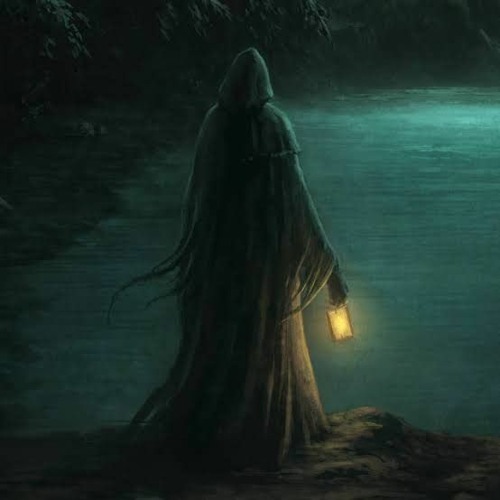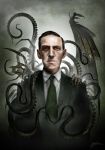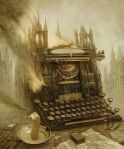Blind Read Through: J.R.R. Tolkien; The Book of Lost Tales, part 1, The Coming of the Elves
“There was a stir among the distant trees and words were spoken suddenly, and feet went to and fro. Then did I say what is this deed that Palúrien my mother has wrought in secret, and I sought her out and questioned her, and she answered: ‘This is no work of mine, but the hand of one far greater did this. Ilúvatar hath awakened his children at the last – ride home to Valinor and tell the Gods that the Eldar have come indeed (pg 114)!'”
Welcome back to another Blind Read! This week we mark the entrance of the Eldar into Beleriand and Valinor, which also signifies a dramatic shift in the lives of the Valar.
The introduction of the Elves in these early works is a bit of a departure from The Silmarillion. Tolkien wrote this chapter with Valar filled with enthusiasm with their newfound “children.” They ran about Valinor cheering and crying out in joy. Oromë even interrupts Varda creating the Seven Stars from Aulë”s forge as he “shouts aloud so that all the ears in Valmar may hear him: ‘Tulielto! Tulielto! They have come – they have come (pg 114)!'”
This sounding call is echoed by many of the other Valar until they work themselves into a frenzy and end up doing something foolish. “Great joy blindeth even the forewisdom of the Gods (pg 114).”
Tolkien is referring to Manwë releasing Melkor from Angaino “before the full time of his doom (pg 114),” though he still kept Tilkal (his fetters or manacles) on his wrists and ankles. In fact, in this telling, the Tilkal stayed on him forever as a reminder of the ages he spent in bondage because of the trickery of the Valar. Manwë releases him because it’s such and event, and such a celebration that even Melkor should be involved. If this seems impetuous and over the top, it absolutely is.
Tolkien understood this and downplayed this excitement in The Silmarillion, though part still exists. The strange twist is that the only Valar who is not excited about the Eldar’s arrival in The Book of Lost Tales is Ulmo. It took me a little introspection to see what Tolkien was trying to sublimate, and it goes back to one of the quotes above. The Valar were blinded by their excitement, making them ignore their “forewisdom” in more than one sense.
In The Silmarillion, Ulmo was the Valar who was said to love the Eldar more than any other, and it was strange to me that he went against the will of those Valar to have the Eldar come to Valinor.
But why were the Eldar so happy that the Eldar had come? “and it was not until that hour that the Gods knew that their joy had contained a flaw, or that they had waited in hunger for it’s completion, but now they knew that the world had been an empty place beset with loneliness having no children for her own (pg 114).”
It wasn’t until the world was populated that the Valar realized the point of their existence. It was about creating a world for these other beings to exist. But unfortunately, they were so hung up on how their projects were progressing and angered at Morgoth for (Melkor) interrupting or ruining those projects that they didn’t realize that the world they had created didn’t have a soul. The coming of the Eldar made that soul in the world.
So why did Ulmo act against them? Because he understood this fundamental tenant because he helped create them. The Eldar were Ilúvatar’s children, but they were born next to “Koivië-néni or the Waters of Awakening (pg 115).” Remember that Ulmo is the Vala of the seas and water, and, in The Fellowship of the Ring, when the horses form in the river that wipe out the Dark Riders following the Hobbits and Aragorn, they were a creation of Ulmo and an indication of his interfering in the lives of the people of Middle-earth. Glorfindel says a prayer to Ulmo in that scene (which was changed to Arwen in the movie), and Ulmo helps them to Rivendell.
Ulmo immediately connects with the Eldar because of his association with them through the Koivië-néni (or Cuiviénen in The Silmarillion). Ulmo knows that exposing the Eldar directly to the immense knowledge of the Valar is a mistake that could, and does, end up having far-reaching issues later on in history. Ulmo believes the Eldar should live in the world and have their own life experiences rather than be involved with gods (or angels).
But Ulmo is outvoted, and three Eldar come in a procession to Valinor, one from each tribe, and we get this loaded paragraph:
“Great was the stir and wonder now about the waters of Koivië, and its end was that three of the Eldar came forward daraing to go with Nornorë, and these he bore now back to Valinor, and their names as the Elves of Kôr have handed them on were Isil Inwë, and Finwë Nólemë who was Turondo’s father, and Tinwë Lintö father of Tinúviel – but the Noldoli call them Inwithiel, Golfinweg, and Tinwelint. Afterward they became very great among the Eldar, and the Teleri were those who followed Isil, but his kindred and descendants are that royal folk of the Inwir of whose blood I am. Nolemë was lord of the Noldoli, and of his son Turondo (or Turgon as they called him) are great tales told, but Tinwë abode not long with his people, and yet ’tis said lives still lord of the scattered Elves of Hisilómë, dancing in its twilight places with Wendelin his spouse, a sprite come long long ago from the quiet gardens of Lórien; yet greatest of all the Elves did Isil Inwë become, and folk reverence his mighty name to this day (pgs 115-116).”
I’m sure you don’t recognize many of those names because Tolkien changed them around (and I suspect they changed which tribe would be which in their ultimate storyline). Isil Inwë later became Ingwë, the lord of the Vanyar, Finwë stayed Finwë lord of the Noldor, but Turgon moved from son to grandson (with the notorious Fëanor, creator of the Silmarils, in the middle). Tinwë Linto became Thingol, and Wendelin moved from a Sprite to the Maiar Melian.
The Eldar who went to Valinor were Ingwë, Finwë, and Elwë (Thingol), as spokespeople for the Eldar. They were met with great fanfare, but the omen of great strife began on that first visit to Valinor. Where Melkor “often did he lie to the Noldoli afterwards when he would stir their restlessness, adding beside all truth that he alone had withstood the general voice and spoken for the freedom of the Elves (pg 177).”
Join me next week as we see where the Elves go next with “The Making of Kôr.”







WOW, that is one fantastic painting!
April 25, 2023 at 4:15 pm